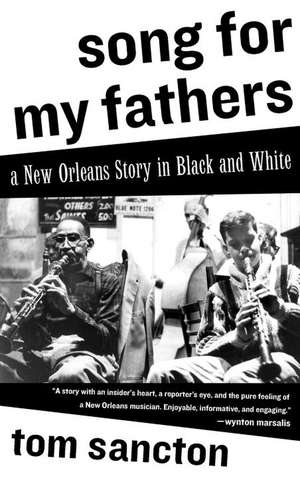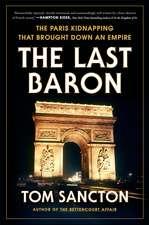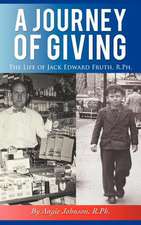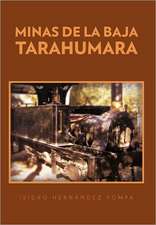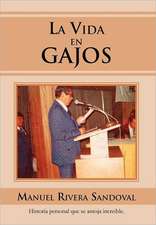Song for My Fathers: A New Orleans Story in Black and White
Autor Tom Sanctonen Limba Engleză Paperback – 31 mar 2010
The boy was introduced into this remarkable fellowship by his father, an eccentric Southern liberal and failed novelist whose powerful articles on race had made him one of the most effective polemicists of the early Civil Rights movement. Nurtured on his father’s belief in racial equality, the aspiring clarinetist embraced the old musicians with a boundless love and admiration. The narrative unfolds against the vivid backdrop of New Orleans in the 1950s and ‘60s. But that magical place is more than decor; it is perhaps the central player, for this story could not have taken place in any other city in the world.
Preț: 98.54 lei
Nou
Puncte Express: 148
Preț estimativ în valută:
18.86€ • 20.49$ • 15.85£
18.86€ • 20.49$ • 15.85£
Carte disponibilă
Livrare economică 31 martie-14 aprilie
Preluare comenzi: 021 569.72.76
Specificații
ISBN-13: 9781590513767
ISBN-10: 1590513762
Pagini: 336
Dimensiuni: 155 x 207 x 30 mm
Greutate: 0.4 kg
Editura: Other Press (NY)
ISBN-10: 1590513762
Pagini: 336
Dimensiuni: 155 x 207 x 30 mm
Greutate: 0.4 kg
Editura: Other Press (NY)
Notă biografică
Tom Sancton graduated from Harvard in 1971 and attended Oxford as a
Rhodes scholar. He is a former senior editor for Time and a contributor to such
publications as Vanity Fair, Fortune, Newsweek, and the Wall Street Journal.
He coauthored the international best seller Death of a Princess: The
Investigation and authored the novel The Armageddon Project. A jazz performer
in his own right, Sancton has toured extensively in Europe and has recorded
more than a dozen albums, appearing alongside Woody Allen in the feature
film Wild Man Blues. In 2007, Sancton was named Andrew W. Mellon Professor in
the Humanities at Tulane University, where he continues to teach advanced
courses in creative writing.
Rhodes scholar. He is a former senior editor for Time and a contributor to such
publications as Vanity Fair, Fortune, Newsweek, and the Wall Street Journal.
He coauthored the international best seller Death of a Princess: The
Investigation and authored the novel The Armageddon Project. A jazz performer
in his own right, Sancton has toured extensively in Europe and has recorded
more than a dozen albums, appearing alongside Woody Allen in the feature
film Wild Man Blues. In 2007, Sancton was named Andrew W. Mellon Professor in
the Humanities at Tulane University, where he continues to teach advanced
courses in creative writing.
Extras
They buried Papa Celestin on a raw winter day. It was early in the morning
when the mourners started arriving at the funeral home on Louisiana Avenue.
By noon, five thousand people and two brass bands jammed the broad two-lane
thoroughfare outside, waiting to take the great trumpeter on his last ride. Two
dozen motorcycle cops revved their engines, preparing to escort the cortege—
and ready to deal with any violence if things got out of hand.
Inside the crowded funeral parlor, black friends and relatives of the fallen
jazzman mingled with his many white admirers—among them, the mayor, a
congressman, prominent businessmen, lawyers, university professors, socialites,
writers, journalists. There were few places in New Orleans where the races could
gather under one roof in those Jim Crow days: segregation was the law of the
land in Louisiana. But they made an exception for Papa Celestin. Apart from
Louis Armstrong, perhaps, he was the closest thing to a local hero that the city
could claim. President Eisenhower had even honored him at the White House
and told him he was “a credit to his race.”
I was five years old and knew nothing about Papa Celestin. But there I was in
the middle of the pressing crowd, bundled up against the December wind and
clutching my mother’s hand. Nearby, my father hovered protectively over my
sisters, Wendy, nine, and Beth, eight. Mother had questioned the wisdom of
bringing us here, but my father had insisted. “In New Orleans,” he said, “a jazz
funeral is a cultural event. These kids will be telling their grandchildren about
the day they buried the great Papa Celestin.”
when the mourners started arriving at the funeral home on Louisiana Avenue.
By noon, five thousand people and two brass bands jammed the broad two-lane
thoroughfare outside, waiting to take the great trumpeter on his last ride. Two
dozen motorcycle cops revved their engines, preparing to escort the cortege—
and ready to deal with any violence if things got out of hand.
Inside the crowded funeral parlor, black friends and relatives of the fallen
jazzman mingled with his many white admirers—among them, the mayor, a
congressman, prominent businessmen, lawyers, university professors, socialites,
writers, journalists. There were few places in New Orleans where the races could
gather under one roof in those Jim Crow days: segregation was the law of the
land in Louisiana. But they made an exception for Papa Celestin. Apart from
Louis Armstrong, perhaps, he was the closest thing to a local hero that the city
could claim. President Eisenhower had even honored him at the White House
and told him he was “a credit to his race.”
I was five years old and knew nothing about Papa Celestin. But there I was in
the middle of the pressing crowd, bundled up against the December wind and
clutching my mother’s hand. Nearby, my father hovered protectively over my
sisters, Wendy, nine, and Beth, eight. Mother had questioned the wisdom of
bringing us here, but my father had insisted. “In New Orleans,” he said, “a jazz
funeral is a cultural event. These kids will be telling their grandchildren about
the day they buried the great Papa Celestin.”
Descriere
Set in New Orleans in the 1950s and 1960s, Sancton's passionate memoir pays tribute to the white father who raised him and to the black founding fathers of Jazz, "the mens" of Preservation Hall, who inspired and encouraged him as he grew, as a musician, and as a man.
